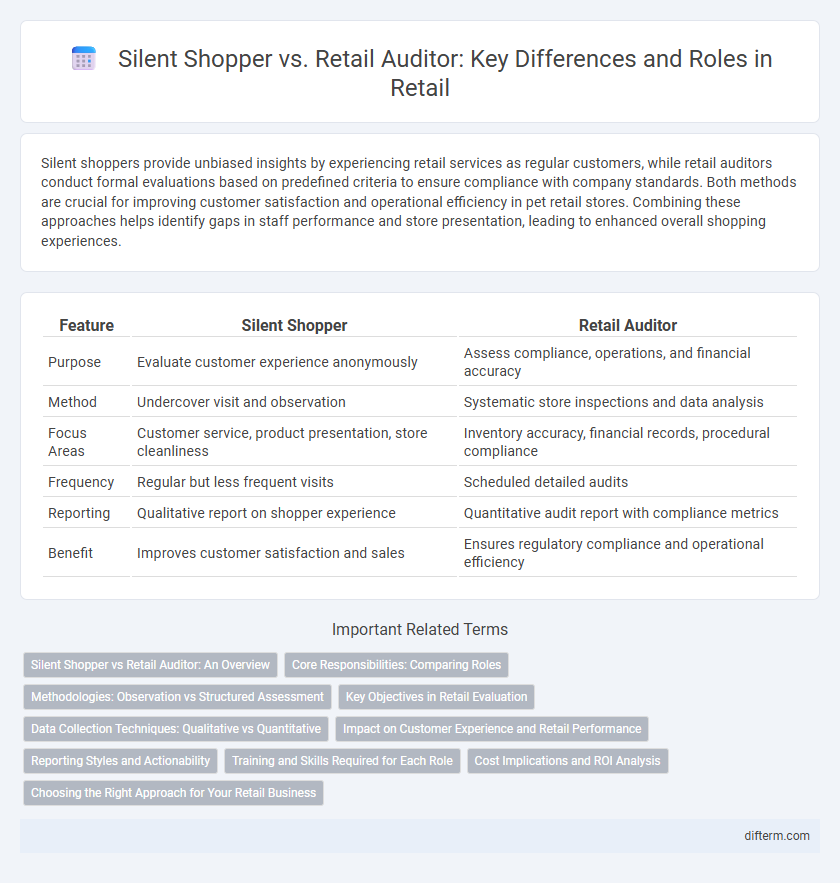Silent shoppers provide unbiased insights by experiencing retail services as regular customers, while retail auditors conduct formal evaluations based on predefined criteria to ensure compliance with company standards. Both methods are crucial for improving customer satisfaction and operational efficiency in pet retail stores. Combining these approaches helps identify gaps in staff performance and store presentation, leading to enhanced overall shopping experiences.
Table of Comparison
| Feature | Silent Shopper | Retail Auditor |
|---|---|---|
| Purpose | Evaluate customer experience anonymously | Assess compliance, operations, and financial accuracy |
| Method | Undercover visit and observation | Systematic store inspections and data analysis |
| Focus Areas | Customer service, product presentation, store cleanliness | Inventory accuracy, financial records, procedural compliance |
| Frequency | Regular but less frequent visits | Scheduled detailed audits |
| Reporting | Qualitative report on shopper experience | Quantitative audit report with compliance metrics |
| Benefit | Improves customer satisfaction and sales | Ensures regulatory compliance and operational efficiency |
Silent Shopper vs Retail Auditor: An Overview
Silent shoppers are individuals who discreetly evaluate the customer experience by posing as regular customers, gathering firsthand insights into service quality and store environment. Retail auditors systematically inspect retail operations through detailed checklists and data analysis, focusing on compliance, inventory accuracy, and merchandising standards. Both roles aim to enhance retail performance, with silent shoppers providing qualitative feedback and retail auditors delivering quantitative assessments.
Core Responsibilities: Comparing Roles
Silent Shoppers primarily focus on evaluating customer service quality and store environment by posing as regular customers, while Retail Auditors concentrate on verifying inventory accuracy, compliance with company policies, and operational procedures. Silent Shoppers provide qualitative insights on employee behavior and merchandising effectiveness, whereas Retail Auditors deliver quantitative data through systematic assessments and reports. Both roles enhance retail performance but differ by emphasizing consumer experience versus operational integrity.
Methodologies: Observation vs Structured Assessment
Silent Shoppers utilize covert observation techniques to evaluate customer service and store ambiance in real-time without employee awareness, providing authentic insights into the shopping experience. Retail Auditors employ structured assessments involving standardized checklists and detailed audits to systematically measure compliance with operational protocols and merchandising standards. These distinct methodologies enable retailers to capture both spontaneous customer interactions and formalized performance metrics for comprehensive store evaluation.
Key Objectives in Retail Evaluation
Silent Shoppers primarily focus on assessing customer service quality, store cleanliness, and employee behavior to provide insights into the shopping experience. Retail Auditors emphasize verifying inventory accuracy, pricing compliance, and adherence to company policies for operational integrity. Both roles aim to enhance overall retail performance through targeted, data-driven evaluations.
Data Collection Techniques: Qualitative vs Quantitative
Silent Shoppers employ qualitative data collection techniques by providing detailed observations on customer service, store ambiance, and employee interactions, capturing experiential insights that help retailers improve the shopping experience. In contrast, Retail Auditors focus on quantitative data collection through systematic checklist-based assessments and inventory verification, generating numerical metrics to ensure compliance and operational accuracy. Together, these approaches enable retailers to balance rich customer feedback with precise performance measurements for strategic decision-making.
Impact on Customer Experience and Retail Performance
Silent shoppers provide authentic insights into customer experience by evaluating store cleanliness, staff behavior, and product availability without alerting employees, helping retailers identify real-time service gaps. Retail auditors focus on compliance, merchandising standards, and inventory accuracy, ensuring operational efficiency and regulatory adherence that underpin consistent retail performance. Combining both approaches enhances overall customer satisfaction and drives sustainable business growth through continuous improvement in frontline service and back-end processes.
Reporting Styles and Actionability
Silent shoppers provide narrative-rich, qualitative reports based on real-time customer experiences, offering actionable insights into service quality and store ambiance. Retail auditors deliver structured, quantitative reports emphasizing compliance metrics, inventory accuracy, and operational standards to identify specific areas for improvement. The combination of both reporting styles enhances decision-making, blending subjective customer perspectives with objective performance data for comprehensive retail analysis.
Training and Skills Required for Each Role
Silent shoppers require strong observational skills, attention to detail, and the ability to remain inconspicuous while assessing customer service and store compliance. Retail auditors need expertise in inventory management, data analysis, and regulatory standards to evaluate operational efficiency and financial accuracy. Both roles demand training in reporting methodologies, but auditors typically undergo more extensive education in auditing principles and retail laws.
Cost Implications and ROI Analysis
Silent shoppers incur lower upfront costs by providing real-time insights through covert evaluations, minimizing disruptions to store operations. Retail auditors require higher investment due to comprehensive data collection and detailed reporting but deliver thorough compliance and inventory accuracy checks. Analyzing ROI, silent shoppers yield quicker feedback loops enhancing customer experience, whereas retail auditors offer long-term operational improvements and risk mitigation, balancing cost with strategic value.
Choosing the Right Approach for Your Retail Business
Silent shoppers provide unbiased, real-time customer experience feedback by anonymously evaluating store conditions, staff interaction, and compliance with brand standards, making them ideal for continuous quality improvement. Retail auditors conduct comprehensive inspections focused on inventory accuracy, regulatory compliance, and operational processes, ensuring adherence to corporate policies and reducing financial discrepancies. Selecting the right approach depends on your retail business goals: use silent shoppers for enhancing customer satisfaction and retail auditors for maintaining operational integrity and regulatory compliance.
Silent Shopper vs Retail Auditor Infographic

 difterm.com
difterm.com